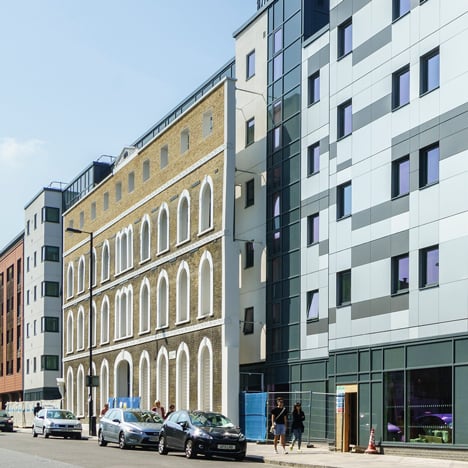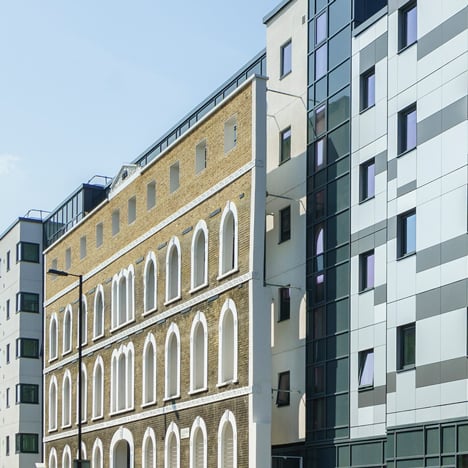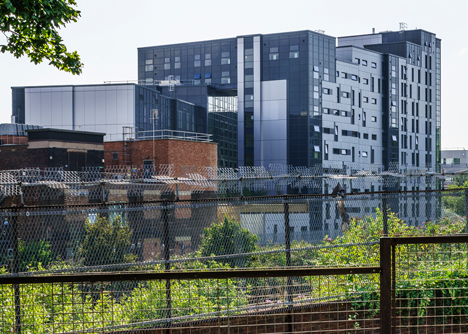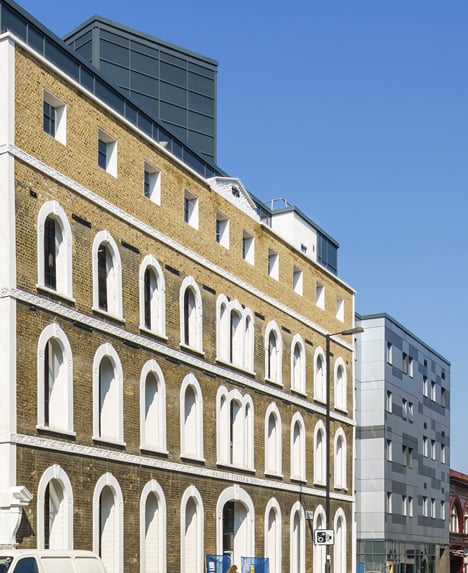
"Prison-like" student housing wins Carbuncle Cup 2013
News: a student housing block in London with a retained brick warehouse facade has been named Britain's worst building of the year.
Building Design magazine has awarded the annual Carbuncle Cup award to a student accommodation block at 465 Caledonian Road in Islington, branding it the ugliest building to be designed in the UK over the past 12 months.
Designed by British firm Stephen George and Partners for University College London, the new building replaced a historic red brick warehouse which was demolished during the build. The original facade was retained and positioned in front of the new building.

"The original frontage has been retained in a cynical gesture towards preservation. But its failings go deeper," said the judges. "This is a building that the jury struggled to see as remotely fit for human occupation."
The jury commented that the majority of bedrooms within the new housing block lack adequate daylight, offer little privacy for the occupants and that those facing the retained facade have no view outside.
"The inmates living behind the massive masonry ruin will acutely feel the heritage of the retained wall, but it is not clear they will be able to see out. Perhaps the architects were influenced by the historic Pentonville Prison down the road," suggested one nominator.

Other shortlisted projects included a 24-metre viewing tower that looks like a helter skelter, a student housing development in Oxford and a sports centre in Wales - known to locals as The Dumpster.
Last year, the title was given to Grimshaw for a steel and glass cocoon containing the historic Cutty Sark tea clipper.
Here's the full announcement:
Scandalous student housing scoops the award for Britain’s worst new building
A multimillion-pound block of student accommodation on London’s Caledonian Road has been named the UK’s worst new building.
465 Caledonian Road, designed by Stephen George and Partners for University College London, was once a historic red brick warehouse that has now been largely demolished despite being protected.
The original frontage has been retained in a cynical gesture towards preservation. But its failings go deeper: this is a building that the jury struggled to see as remotely fit for human occupation.
The majority of rooms lack adequate daylight, offer little privacy and a significant number facing the retained facade have no direct view out at all.
"There is no small irony in the fact that the building stands on the same street as HMP Pentonville," said BD executive editor and Carbuncle Cup juror Ellis Woodman.
"As the first intake of students move into their dark and far from private rooms next month, they might be forgiven for wondering why the prisoners have been provided with the better view."

The building was originally refused planning consent by Islington Council but was approved on appeal by the planning inspectorate on the grounds that students don't require the same quality of accommodation as the rest of society.
The runner-up for the Carbuncle Cup, which is awarded annually by the leading architecture industry title Building Design (BD), was also student accommodation.
Student housing is one of the few building types that has continued to be built in large quantity throughout the downturn and all too frequently to a level of quality that is little short of an insult to the buildings' inhabitants.
"A look at the rapidly growing student accommodation sector provides an insight into trends in property development globally, and is alarming for lovers of the city and of architecture," said Hank Dittmar, Carbuncle Cup juror and special advisor to HRH the Prince of Wales on Global Urbanisation.
"It seems to be felt that occupancy of less than a year and busy student lifestyles mean that standards can be reduced."